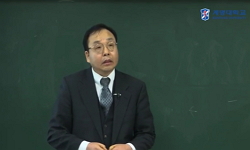The choice of the distribution of state power and how to exercise it is a matter of agreement of the political community. If efficient and democratic operation is guaranteed, it will certainly be understood as an improvement, but if the amendment deni...
http://chineseinput.net/에서 pinyin(병음)방식으로 중국어를 변환할 수 있습니다.
변환된 중국어를 복사하여 사용하시면 됩니다.
- 中文 을 입력하시려면 zhongwen을 입력하시고 space를누르시면됩니다.
- 北京 을 입력하시려면 beijing을 입력하시고 space를 누르시면 됩니다.

중국의 헌법 개정과 중국공산당의 헌법적 지위 변화 = Revision of the Constitution of China and the Change of the Constitutional Status of the Communist Party of China
한글로보기부가정보
다국어 초록 (Multilingual Abstract)
The choice of the distribution of state power and how to exercise it is a matter of agreement of the political community. If efficient and democratic operation is guaranteed, it will certainly be understood as an improvement, but if the amendment denies their principles, fails to ensure the national interest and development of the amendment as a whole, and rather leads to the prospect of the emergence of uncontrolled state power or political power, this would certainly be perceived as ‘dogged’. It is enough to worry that the Chinese government, which emphasized the rule of law and the rule of law, may backtrack or effectively signal a withdrawal of the rule of law in what it wants to base its establishment on the National Inspection Committee, which is seriously concerned about the damage of the rule of law. In light of the founding principles of the Socialist Revolutionary Party, it is not certain whether the Communist Party’s strengthening of leadership status is taking direction and speed in a balanced manner. Also, considering that the political assessment of the period when the separation principle between the party and the government, which had been used as a principle since the founding of the Communist Party of China, was never positive, artificial insertion of the strengthening of the status of the Communist Party of China into the constitutional regulations would not be an appropriate change in the constitutional order.
참고문헌 (Reference)
1 이도기, "현대중국공산당의 이해" 통일신문사 2008
2 손한기, "중국의 헌법개정- 2018년 중국헌법개정의 주요 내용과 그에 대한 평가를 중심으로" 법학연구원 (61) : 27-59, 2018
3 이재준, "중국, 내달 출범 ‘슈퍼 사정기관’ 국가감찰위 지방조직 구성완료"
4 편상욱, "중국 헌법개정안 통과… 시진핑, 사실상 ‘시 황제’ 등극"
5 한상돈, "중국 사회주의법치의 발전과 과제" 한국법학원 158 (158): 191-211, 2017
6 남종호, "중국 사회주의 제도에서의 공산당 영도지위" 한중사회과학학회 12 (12): 31-54, 2014
7 이종화, "중국 당정관계(黨政關係)의 지속과 변화" 중국연구센터 17 : 99-132, 2012
8 김준영, "시진핑, 한 자루의 칼을 더 얻었다"
9 中國共産黨, "黨章" 中共中央黨校出版社 2017
10 鄧小平, "鄧小平文選" 人民出版社 1994
1 이도기, "현대중국공산당의 이해" 통일신문사 2008
2 손한기, "중국의 헌법개정- 2018년 중국헌법개정의 주요 내용과 그에 대한 평가를 중심으로" 법학연구원 (61) : 27-59, 2018
3 이재준, "중국, 내달 출범 ‘슈퍼 사정기관’ 국가감찰위 지방조직 구성완료"
4 편상욱, "중국 헌법개정안 통과… 시진핑, 사실상 ‘시 황제’ 등극"
5 한상돈, "중국 사회주의법치의 발전과 과제" 한국법학원 158 (158): 191-211, 2017
6 남종호, "중국 사회주의 제도에서의 공산당 영도지위" 한중사회과학학회 12 (12): 31-54, 2014
7 이종화, "중국 당정관계(黨政關係)의 지속과 변화" 중국연구센터 17 : 99-132, 2012
8 김준영, "시진핑, 한 자루의 칼을 더 얻었다"
9 中國共産黨, "黨章" 中共中央黨校出版社 2017
10 鄧小平, "鄧小平文選" 人民出版社 1994
11 刘玫, "论监察委员会的调查措施" 2018 (2018): 2018
12 中央纪委国家监委法规室, "监察法释义(7) 各级监察委员会的机构设置"
13 中央纪委国家监委法规室, "监察法释义(47) 检察机关对监察机关移送的案件如何处理"
14 中央纪委国家监委法规室, "监察法释义(43) 留置措施的审批权限、期限、执行和解除"
15 中央纪委国家监委法规室, "监察法释义(39) 监察机关立案的条件和程序, 以及立案后处理的规定"
16 中央纪委国家监委法规室, "监察法释义(37) 问题线索处置程序和要求"
17 中央纪委国家监委法规室, "监察法释义(35) 监察机关处理报案、举报的规定"
18 中央纪委国家监委法规室, "监察法释义(34) 职务违法犯罪问题线索移送制度和管辖"
19 中央纪委国家监委法规室, "监察法释义(3) 监察委员会的性质和职能"
20 中央纪委国家监委法规室, "监察法释义(20) 监察机关要求被调查人陈述和讯问被调查人的权限"
21 中央纪委国家监委法规室, "监察法释义(11) 监察委员会职责"
22 凤凰财经, "监察委 “留置”第一案: 山煤原董事长被采取留置措施. 4. 14"
23 魯士恭, "當代中國黨政關係硏究" 上海人民出版社 2001
24 江澤民, "江澤民文選" 人民出版社 2006
25 毛澤東, "毛澤東文集" 人民出版社 1999
26 韓大元, "憲法學基礎理論" 中國政法大學出版社 2008
27 陈瑞华, "当监察法与刑诉法关系遭遇困境" 2017 (2017): 2017
28 周鴻剛, "大學生入黨敎材" 上海大學出版社 2005
29 房清侠, "国家监察立法中的法律协调问题探究" 2018 (2018): 2018
30 姜明安, "国家监察法立法的几个重要问题" 2017 (2017): 2017
31 马国英, "国家监察委员会揭幕! 如何再造现有反腐机构?"
32 李建国, "关于 ≪中华人民共和国监察法(草案)≫的说明 -2018年3月13日在第十三届全国人民代表大会第一次会议上"
33 胡錦光, "中國憲法" 法律出版社 2014
34 胡锦涛, "中國共産黨第17次全國代表大會文件" 人民出版社 2007
35 梶田幸雄, "中国監察法(草案)の問題点~監視社会化へ進む中国" 25 : 2018
36 배덕현, "「중화인민공화국 감찰법」의 주요내용과 평가 및 전망" 한중사회과학학회 16 (16): 23-62, 2018
37 Nectar Gan, "Surprise choice for China’s new anti-graft watchdog signals Communist Party’s authority over the state"
38 Simon Denyer, "China’s leader tightens grip with new anti-corruption agency"
39 Amesty, "China: Submission to the NPC Standing Committee’s Legislative Affairs Commission on the draft Supervision Law"
40 Nicholas Bequelin, "China: New Supervision Law a systemic threat to human rights"
41 Buckley, C., "China moves to let Xi stay in power by abolishing term limit"
42 Berger, B., "All That Xi Wants: China’s Communist Party is Trying to Reform the Country from the Top Down"
43 법무법인 율촌, "2018년 중국의 정부조직개편과 우리나라 기업에 대한 시사점" 2018 (2018): 2018
44 石仲泉, ""三個代表"重要思想新論" 廣東人民出版社 2004
동일학술지(권/호) 다른 논문
-
중국 O2O 신유통에 관한 연구 -차오지우종 사례를 중심으로-
- 한중사회과학학회
- 소방방
- 2019
- KCI등재
-
중국 양적완화 정책에 따른 부동산버블과 은행대출간 실증연구
- 한중사회과학학회
- 김선진
- 2019
- KCI등재
-
중국 전자상거래법상의 계약법제에 관한 고찰 -전자상거래 계약성립을 중심으로-
- 한중사회과학학회
- 윤상윤
- 2019
- KCI등재
-
- 한중사회과학학회
- 김혜진
- 2019
- KCI등재
분석정보
인용정보 인용지수 설명보기
학술지 이력
| 연월일 | 이력구분 | 이력상세 | 등재구분 |
|---|---|---|---|
| 2026 | 평가예정 | 재인증평가 신청대상 (재인증) | |
| 2020-01-01 | 평가 | 등재학술지 유지 (재인증) |  |
| 2017-01-01 | 평가 | 등재학술지 유지 (계속평가) |  |
| 2013-01-01 | 평가 | 등재학술지 유지 (등재유지) |  |
| 2010-01-01 | 평가 | 등재학술지 선정 (등재후보2차) |  |
| 2009-01-01 | 평가 | 등재후보 1차 PASS (등재후보1차) |  |
| 2007-01-01 | 평가 | 등재후보학술지 선정 (신규평가) |  |
학술지 인용정보
| 기준연도 | WOS-KCI 통합IF(2년) | KCIF(2년) | KCIF(3년) |
|---|---|---|---|
| 2016 | 0.39 | 0.39 | 0.41 |
| KCIF(4년) | KCIF(5년) | 중심성지수(3년) | 즉시성지수 |
| 0.35 | 0.34 | 0.553 | 0.31 |




 KISS
KISS



